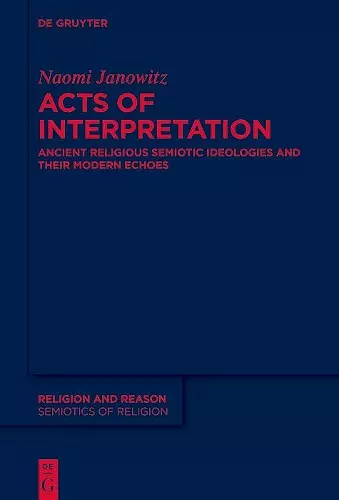Acts of Interpretation
Ancient Religious Semiotic Ideologies and Their Modern Echoes
Format:Hardback
Publisher:De Gruyter
Published:23rd May '22
Currently unavailable, and unfortunately no date known when it will be back

Ancient authors debated proper verbal and non-verbal signs as representations of divinity. These understanding of signs were based on ideas drawn from language and thus limited due to a their partial understanding of the multi-functionality of signs. Charles S. Peirce’s semiotics, as adapted by anthropological linguists including Michael Silverstein, better explains the contextual linkages ("performativity") of ancient religious signs such as divine names. Sign meaning is always dependent on processes of interpretation and is always open to reinterpretation. Focusing on these processes permits a more detailed analysis of the ancient evidence. Examples are drawn from ancient Israelite verbal and non-verbal divine representation, the apostle Paul’s linguistic letter/spirit model, Christian debates about the limits of language to best represent the deity, Josephus’ aniconic advertisement of Jewish rites, the multi-layered divine representations in the Dura-Europos synagogue, the diverse "performativity" of Jewish ascent liturgies, and—the single modern example—the role of art at Burning Man. Divine representation is the basis for ritual efficacy even as sign meaning is a constant source of contention.
ISBN: 9783110768596
Dimensions: unknown
Weight: 375g
170 pages